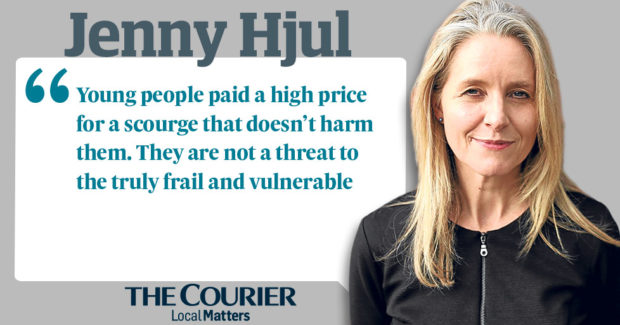Of all the crass catchphrases uttered by our political leaders during the pandemic, the worst has to be: “Don’t kill your gran,” Jenny Hjul says.
Levelled at young people who are deemed old enough to be responsible for their behaviour, it is much favoured by tone-deaf politicians as a guilt-trip tactic.
Matt Hancock maybe thought repeating this slogan (origin Preston City Council) during a round of radio interviews would come across as tough love to the latest Covid culprits.
These he identified as affluent youngsters, particularly in the 17 to 21 age group, who he asked: “How much are you willing to risk the lives of yourself and others by breaking the social distancing rules?”
Almost immune
As he is the health secretary, he should know by now that this demographic is almost immune to the ravages of the virus. Statistically, they are more likely to die in a road accident than from the disease.
But even if their own mortality is not much of an issue, why should they carry any moral burden if there is a second spike?
Hancock may pick on middle-class kids now because the most recent increases are not in poorer areas, as has been the case. But it has long been open season on the young, regardless of their background.
Nicola Sturgeon and her medical sidekick Jason Leitch also pick on the under-25s, while the deputy chief medical officer for England, Jonathan Van Tam, has pointed the finger at youthful “potent spreaders” who have relaxed too much.
But are they not doing just what the government demanded by going back to restaurants, pubs, schools and universities?
During the lockdown, teenagers and young adults had to forgo their social networks, their end-of-school celebrations, and their fledgling freedom at university.
They then endured the exams fiasco and now they face further uncertainty as they head back to university – that is, if they managed to secure a place at all.
Missing out
Depending on the institution, students will mostly be expected to learn online. They will miss out on all the interactions that should make higher education one of the most enriching experiences of their lives.
Before they even return to their campuses, they are being shamed for the potential risk they pose to their tutors.
Jo Grady, general secretary of the University and College Union for lecturers, said universities would be the care homes of a second wave of coronavirus if students set foot in classrooms.
The rate of deaths in care homes at the height of the crisis was one of the tragedies of the coronavirus, partly attributable to government failings, in Scotland and England, and partly to the fragility of elderly residents.
Ignoring the evidence
Suggesting that young people could trigger a comparable public health disaster ignores the evidence, not just in Britain but across Europe.
Surges in cases have not been matched by sharp rises in hospital admissions, which experts say is because the viral load is lower this time round and because the people testing positive are younger.
This age group is not spreading death and destruction in its wake, however reckless post-lockdown socialising has been in the past three months.
In fact, on the whole, young people have abided by the rules, wearing face masks on public transport and in shops, staying with their families when they had to, and keeping their distance from those grannies.
Only 400 parties
With a chance to reclaim their lives, a grudging (especially in Scotland) step at a time, they didn’t go half as wild as could have been expected. Police in Glasgow broke up only 400 parties last weekend.
It is this lot’s future jobs that have been most jeopardised by government failings in handling the coronavirus outbreak.
The hospitality and tourism sectors, which typically employ school-leavers and graduates, are unlikely to fully recover in Scotland if Sturgeon continues to misuse the extraordinary Covid powers at her disposal to curtail people’s liberties.
Throughout the UK, impetuous quarantine restrictions prevent young people – perhaps just Hancock’s affluent ones – from letting their hair down abroad, though they deserve a break.
Incompetent education ministers
For six months they have been at the mercy of incompetent education ministers, hapless health departments which force people to travel 75 miles for coronavirus tests, sanctimonious officials who break the rules, and preposterous modellers who have miscalculated the risks by about 200,000 deaths.
Add to that, all the mixed messaging, the bickering scientific advisers, and the devolved regimes perpetuating petty disagreements to advance their political goals, and it is a wonder that the young have not rebelled en masse.
They have already paid too high a price for a scourge that doesn’t harm them. They are not a threat to the truly frail and vulnerable, who have learned to protect themselves, and government should stop holding them accountable for ills of their own making.



